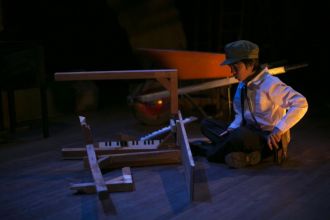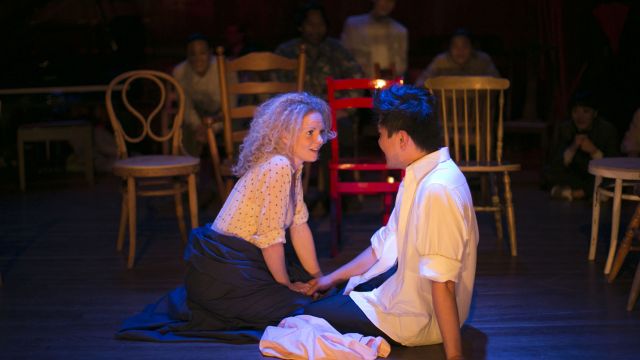His Mother’s Voice
As well as being a heart-warming love story, this is a play about courage in the face of brutality and the terrible risk of clinging on to something you hold dearer than the might and power of the state.
Based on the story of a young Chinese pianist whose mother taught him the notes of the piano by painting a secret keyboard on the kitchen table and singing the notes to him as he touched them, Justin Fleming has created beautiful characters that tell his story in carefully chosen words and striking, sometimes shocking, images. At its heart are the tragic misconceptions of the Chinese Cultural Revolution, the misguided cruelty of the Red Guard and the tenuous developments of Sino-Australian diplomatic relations in the 1970s and 80s.
The play was originally written for 7 actors playing 13 plus roles, all but two of them Chinese, but such was the response to the audition from Sydney’s Asian performers, that director Suzanne Miller was able to extend the cast to 12, and in so doing, make the fear and tension of the revolutionary scenes stunningly real.
 She says in her notes to the audience: “All over Sydney there are actors with diverse and interesting heritages, all accomplished, all committed and professional, and keen to work” and this is borne out in her production. In both leading and support roles there is a sense of sustained commitment. Whether brandishing bamboo pikes as young Red Guard revolutionaries, reacting to the mass hysteria conjoured by Madam Mao or Madam Zhang, listening to the hushed notes of a forbidden music lesson, or swiftly and silently moving props, the motivation and energy of this cast is palpable.
She says in her notes to the audience: “All over Sydney there are actors with diverse and interesting heritages, all accomplished, all committed and professional, and keen to work” and this is borne out in her production. In both leading and support roles there is a sense of sustained commitment. Whether brandishing bamboo pikes as young Red Guard revolutionaries, reacting to the mass hysteria conjoured by Madam Mao or Madam Zhang, listening to the hushed notes of a forbidden music lesson, or swiftly and silently moving props, the motivation and energy of this cast is palpable.
Millar is accomplished at moving a large, ensemble cast and conveying vivid images with choreography that is carefully planned and thoroughly rehearsed. She uses this skill to enhance the poignancy of Fleming’s text, which blends the cultural and political rhythms of east and west in an intricate pattern. There is incredible pathos in this play, and it is treated delicately and tenuously. There is also harshness and violence that is portrayed just as cleverly.
Music underscores every moment of this play and whether recorded or live, the lingering notes hover in the open space of theatyp theatre. Sound designer James Colla and lighting designer Christopher Page, use creative vision to creative an atmosphere that beats with the changing rhythms of the action.

Whilst all members of the cast portray their many characters convincingly, it is Renee Lim whose performance is most remarkable. She plays Yang Jia, a piano teacher who teaches classical piano. When western music is outlawed in Mao’s China, she is attacked by altruist young Red Guard. Her music is destroyed, her husband killed, her piano removed. Despite she perseveres with a painted keyboard to teach music to her young son.
Lim plays this role with intense focus and gentle understanding. She finds every nuance in Fleming’s dialogue and the messages between lines that bring great depth to her character. Her pauses are as potent as her words. Her cries as she is viciously beaten are horribly believable. Later, with the slightest of changes in voice and movement,she shows the weight and wear of time and sacrifice. It is a remarkable performance.
As her husband, Qian Bo, John Gomez Goodway is equally believable. He establishes the gentleness of Bo’s love of his family and pride in his wife in one short scene before, in disbelief, he goes to her defence and is brutally murdered.
 Isaiah Powell, a Year 7 student at Normanhurst Boys’ High, plays her son Liu as a young boy. Though this is Isaiah’s stage debut, he is convincing in the role, and as part of the ensemble.
Isaiah Powell, a Year 7 student at Normanhurst Boys’ High, plays her son Liu as a young boy. Though this is Isaiah’s stage debut, he is convincing in the role, and as part of the ensemble.
The older Liu’s is played Harry Tseng, who finds the taut control and resentment that always hovers beneath be his great musical talent. His relationship with translator, Emma Fielden (played by Danielle Jackson), is beautifully crafted and developed in the script. It shows them reaching out tenuously from their different worlds and finding strength and determination in their love – and both actors make that relationship believably real.
Michael Gooley plays Emma’s father, Alex Fielden, an Australian diplomat steeped in Oriental ways, anxious not to damage in any way the flimsy diplomatic ties he has established. Gooley handles an interchange as arbiter between Liu and Chinese diplomats with suitable aplomb.
Singling out these actors in no way detracts from the ensemble as a whole. There is an overwhelming sense of unity in this production, a sense of strong belief and transformation – and this underlines bAKEHOUSE theatre’s goals of showcasing “new voices … telling new stories from new communities”.
Carol Wimmer
Images: Tessa Tran, Breathing Light Photography
Subscribe to our E-Newsletter, buy our latest print edition or find a Performing Arts book at Book Nook.

